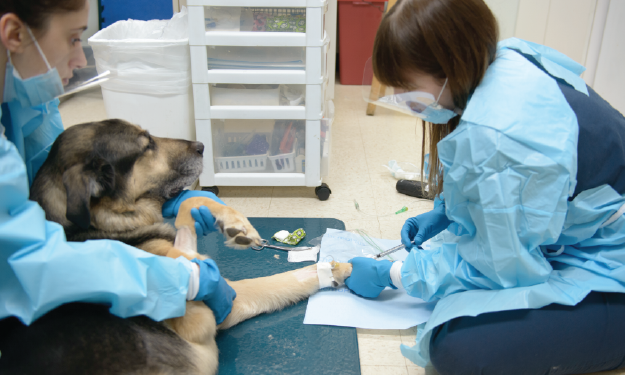Chemotherapy to Treat Lymphoma in Dogs

How is Canine Lymphoma Best Treated?
Lymphoma is a cancer type that is best treated with chemotherapy. Several types of chemotherapy can be used to successfully treat lymphoma; however treatment protocols that include several different agents (i.e. multi-agent chemotherapy) are associated with the longest reported survival times. Common features of such multi-agent protocols include the use of at least 4 chemotherapy drugs administered weekly over a period of 12-18 weeks, and the inclusion of the drugs doxorubicin or CCNU.
Treatment protocols often include an induction phase during which weekly treatments are administered. The goal of induction chemotherapy is to induce a remission, defined by the resolution of all signs of lymphoma, while preserving good quality of life. A complete remission is expected in 70-80% of dogs receiving multi-agent chemotherapy.
A maintenance chemotherapy protocol can be recommended following the completion of induction chemotherapy on a case-by-case basis. Maintenance chemotherapy is a low intensity treatment consisting of oral medications given at home and infrequent intravenous treatments in the veterinary hospital.
What are the Different Medications Used in Treatment?
- L-Asparginase: L-Asparginase, also referred to as Elspar, is an intramuscular injection that works quickly in destroying lymphoma cells. L-asparginase breaks down a critical food source that is uniquely required by malignant cancer cells. L-Asparginase is a well tolerated medication with side effects seen in less than 1/500 cases treated. The rare side effects of L-asparginase may include allergic reactions and vomiting.
- Vincristine: Vincristine, also known as Oncovin, is a chemotherapy drug that kills cancer cells as they go through the process of cell division. Side effects of vincristine can include a reduction in appetite, vomiting, and occasional diarrhea. Side effects of vincristine typically occur in the first 24-72 hours after treatment. If vomiting, diarrhea or poor appetite continues for more than 24-36 hours, we recommend you contact us. Vincristine can cause tissue irritation if the drug leaks out of the vein.
- Cyclophosphamide: Cyclophosphamide, also known as Cytoxan, is a form of chemotherapy that alters the DNA of cancer cells. In lymphoma patients, cyclophosphamide is often given in conjunction with vincristine. Cyclophosphamide can be administered orally in a tablet form or as an intravenous injection. The main side effects of cyclophosphamide include vomiting, diarrhea, and suppression of the white blood cells. If vomiting and diarrhea occur, it is typically mild and self-limiting within 1-2 days. Because cyclophosphamide causes reduction in white blood cell counts, a complete blood count (CBC) is often recommended 7 days after treatment.
- Doxorubicin: Doxorubicin, more commonly referred to as Adriamycin, damages the DNA of cancer cells. Doxorubicin is one of the most important chemotherapy drugs used in the initial treatment of lymphoma. It is given intravenously through a well-placed intravenous catheter due to the fact that significant tissue damage can occur if doxorubicin leaks out of the vein. The treatment with doxorubicin, an infusion, typically takes ~30 minutes.
- The side effects of doxorubicin include vomiting, diarrhea, reduction in white blood cell counts, and occasional kidney-associated toxicity in dogs. These side effects are seen in less than 10% of dogs. It is, however, not uncommon to see one or two episodes of vomiting or diarrhea within the first 1-2 days of treatment. If either of these symptoms persist or become more severe, we recommend that you contact us. Due to the potential for reduction in white blood cell counts, a CBC is recommended 7 days after treatment.
- Prednisone: Prednisone is a corticosteroid that can be administered in a tablet, liquid, or injectable formulation. This medication is helpful in treating lymphoma and is often given throughout the initial phases of the protocol. Prednisone is typically well-tolerated in dogs, but increased appetite and increased urination may be noted. Rarely, vomiting and diarrhea can be seen associated with prednisone treatment.